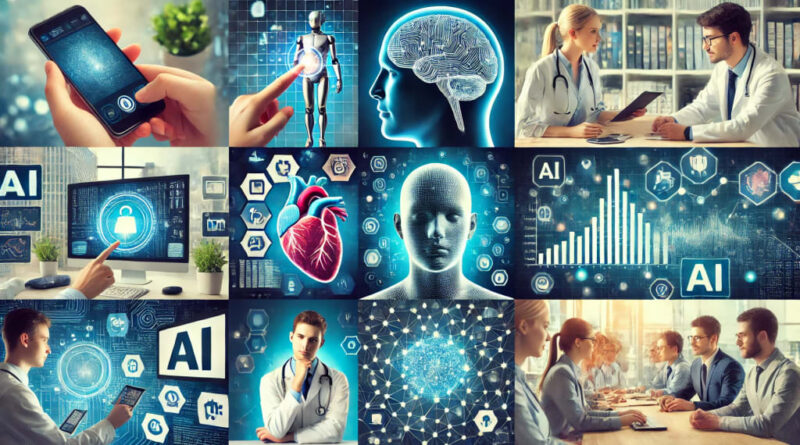How is AI Revolutionizing Our Everyday Lives?
Artificial Intelligence (AI) is no longer just a futuristic concept seen in movies or imagined by scientists—it’s a present-day reality that’s transforming the way we live, work, and interact with the world. From enhancing productivity to reshaping industries, AI is revolutionizing almost every aspect of our daily lives. While we may not always recognize it, AI is embedded in many tools, devices, and services we use every day, often making our lives more convenient, efficient, and connected. In this article, we’ll explore how AI is impacting our lives and the myriad of ways it’s driving innovation and change.
1. Personal Assistants: A Seamless Integration of AI in Our Homes
AI-powered personal assistants like Apple’s Siri, Amazon’s Alexa, and Google Assistant have become household names. These virtual assistants use natural language processing (NLP) to understand and respond to voice commands, making it easier for users to manage daily tasks. Whether it’s controlling smart home devices, setting reminders, playing music, or checking the weather, personal assistants have brought AI directly into our homes.
- Smart homes: AI integration allows for smart thermostats, lighting systems, security cameras, and more. Devices like the Nest Thermostat learn your preferences and adjust the temperature for optimal comfort, all while saving energy.
2. AI in Healthcare: Revolutionizing Diagnosis and Treatment
AI is also making significant strides in the healthcare industry, transforming both patient care and medical practices. From improving diagnostic accuracy to predicting patient outcomes, AI is enabling healthcare professionals to make more informed decisions.
- Medical imaging and diagnostics: AI algorithms can analyze medical images such as X-rays and MRIs with high precision, often detecting conditions like cancers, tumors, or fractures that might be missed by the human eye.
- Personalized treatment: AI can analyze a patient’s medical history, genetic information, and lifestyle data to suggest personalized treatment plans that maximize effectiveness.
- Virtual health assistants: Chatbots powered by AI can help patients schedule appointments, answer medical questions, and provide basic diagnostic assistance, improving accessibility to healthcare services.
3. AI in Transportation: The Future of Mobility
AI is playing a major role in transforming the transportation sector, with applications ranging from autonomous vehicles to smarter traffic systems. The introduction of AI in transportation is reshaping how we travel, making it safer, more efficient, and often more eco-friendly.
- Self-driving cars: Companies like Tesla, Waymo, and Uber are leading the way in developing self-driving cars. These vehicles rely on AI to interpret sensor data, make decisions, and navigate roads without human intervention. The potential benefits of AI-powered vehicles include reduced traffic accidents, improved traffic flow, and greater mobility for those who can’t drive.
- Traffic management systems: AI can also optimize traffic flow in real time by analyzing traffic patterns, adjusting traffic lights, and preventing congestion. This technology improves urban mobility and helps reduce fuel consumption.
4. AI in Entertainment: Personalized Content and Enhanced Experiences
AI is changing the way we consume entertainment, from movies and music to gaming and social media. AI-powered recommendation systems analyze our preferences and behaviors to suggest content that we are likely to enjoy, creating more personalized entertainment experiences.
- Streaming services: Platforms like Netflix, Hulu, and Spotify use AI to recommend movies, shows, and music based on our viewing or listening history. These algorithms help ensure that users find content they love without endlessly scrolling or searching.
- Gaming: AI is revolutionizing the gaming industry, creating more immersive and dynamic gameplay. AI-powered non-playable characters (NPCs) can respond to players’ actions in more lifelike ways, while procedural content generation allows for endless new worlds and adventures.
5. AI in E-commerce: Revolutionizing Shopping Experiences
AI is fundamentally transforming the way we shop online and in stores. By analyzing consumer behavior and preferences, AI helps businesses offer more personalized shopping experiences, improve customer service, and streamline inventory management.
- Product recommendations: E-commerce giants like Amazon and eBay use AI to provide tailored product suggestions based on browsing history, purchases, and customer preferences.
- Chatbots and customer support: AI-driven chatbots are becoming a staple of online customer service, offering 24/7 assistance, answering common questions, and even processing transactions.
- Virtual try-ons: AI-powered augmented reality (AR) apps allow customers to virtually try on clothing, makeup, or accessories, providing a more interactive and personalized shopping experience.
6. AI in Education: Tailored Learning Experiences
AI is transforming the education sector by providing personalized learning experiences that adapt to the needs of individual students. AI can help students learn at their own pace, provide real-time feedback, and even assist educators in managing their classrooms more effectively.
- Personalized learning: AI-powered platforms like Duolingo and Khan Academy can tailor lessons to each student’s progress, strengths, and weaknesses, allowing for more effective learning experiences.
- Smart content: AI is being used to create customized educational content, such as e-textbooks that adapt to a student’s learning style or provide additional resources based on performance.
- AI tutors: Virtual tutors powered by AI are available to assist students with homework, test preparation, and additional learning support outside of the classroom.
7. AI in Finance: Smarter Investments and Enhanced Security
The finance industry is leveraging AI to improve efficiency, reduce risk, and provide more personalized services to customers. From fraud detection to robo-advisors, AI is revolutionizing how we manage our finances and invest our money.
- Fraud detection: AI algorithms can monitor transactions in real time to identify suspicious activities or patterns that may indicate fraudulent behavior, helping to protect consumers and businesses.
- Robo-advisors: AI-driven robo-advisors provide investment advice by analyzing market trends and individual risk tolerance. These services offer low-cost, accessible financial planning for everyone, regardless of their financial expertise.
- Algorithmic trading: AI is used by hedge funds and trading firms to predict market movements and make real-time investment decisions, maximizing profitability and reducing human error.
8. AI in Customer Service: Improving Efficiency and Satisfaction
AI is revolutionizing customer service by automating routine tasks, providing instant support, and offering more personalized interactions. Chatbots, virtual assistants, and AI-driven help desks have drastically improved how businesses engage with customers.
- Chatbots: AI-powered chatbots are used across websites and social media platforms to handle inquiries, process orders, and resolve customer issues quickly and efficiently, often 24/7.
- Personalized interactions: AI tools can analyze customer data and previous interactions to offer personalized responses, improving customer satisfaction and loyalty.
9. AI in Security: Protecting Our Digital and Physical Worlds
AI is being used in a variety of security applications, from online protection to physical surveillance. By analyzing vast amounts of data in real-time, AI systems can detect threats, prevent cyberattacks, and enhance overall security.
- Cybersecurity: AI systems can monitor network activity for unusual behavior, detect potential cyber threats, and take action to neutralize risks, providing a higher level of protection than traditional security methods.
- Surveillance and monitoring: AI-powered surveillance systems are used in public spaces, workplaces, and private properties to detect suspicious activities, identify potential threats, and ensure safety.
10. AI in Manufacturing: Streamlining Processes and Improving Efficiency
The manufacturing industry has also been transformed by AI, which is helping companies automate processes, reduce waste, and improve production quality.
- Predictive maintenance: AI can predict when machines are likely to break down, allowing for preventive maintenance and reducing costly downtime.
- Supply chain optimization: AI is used to optimize inventory management, streamline supply chains, and ensure timely deliveries, reducing costs and improving operational efficiency.
Conclusion: A Future Shaped by AI
Artificial Intelligence is no longer a distant possibility—it’s already making a profound impact on our everyday lives. Whether it’s improving healthcare, transforming education, personalizing our shopping experiences, or enhancing our productivity, AI is revolutionizing the way we live and work. As AI technology continues to evolve, we can expect even greater innovations that will shape our future in ways we can only begin to imagine.
From the simplest conveniences like voice-activated assistants to complex transformations in industries like healthcare, transportation, and finance, AI is poised to make our lives more efficient, connected, and intelligent. However, as we continue to embrace AI, it’s important to consider its ethical implications and ensure that these technologies are used responsibly for the benefit of all.
AI is here to stay, and its influence is only going to grow—making it an exciting time to witness the ongoing revolution in our everyday lives.

